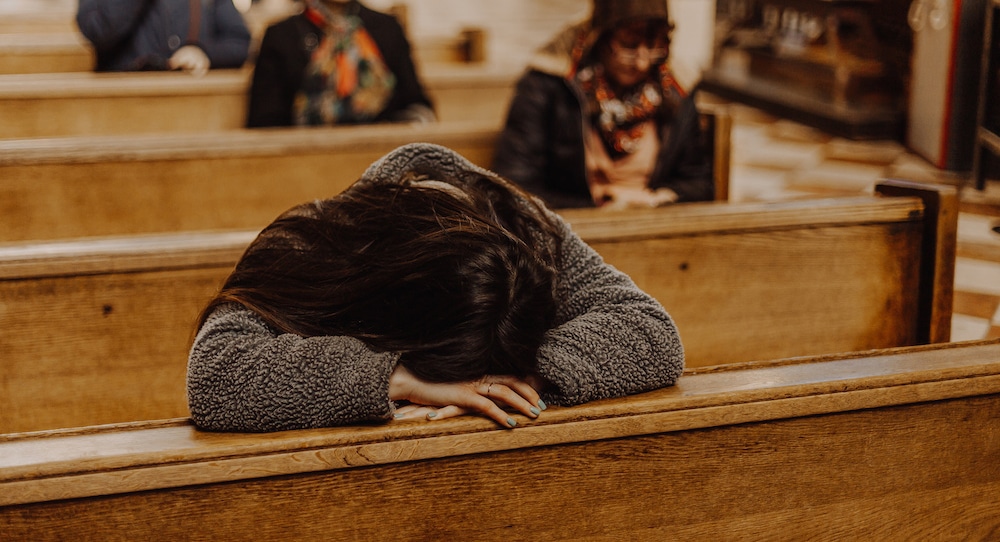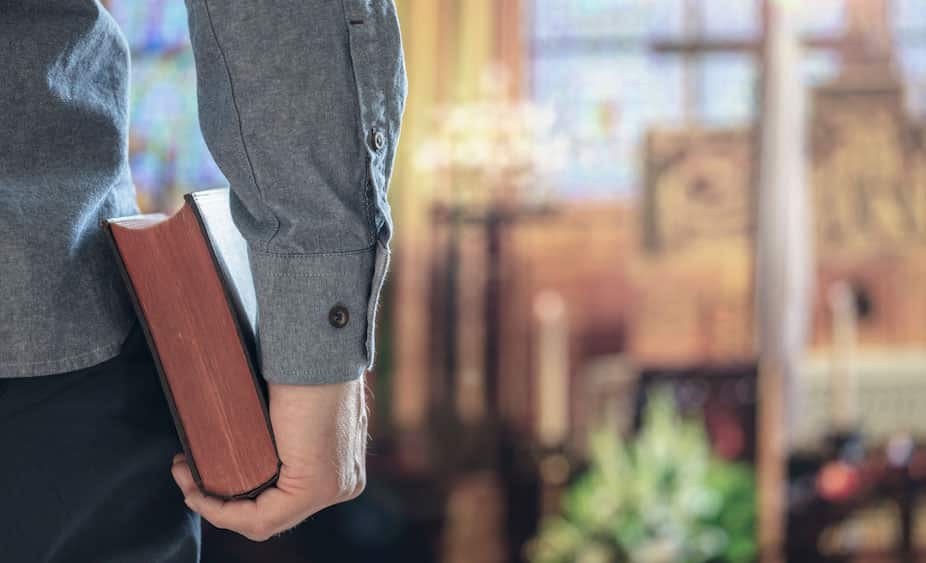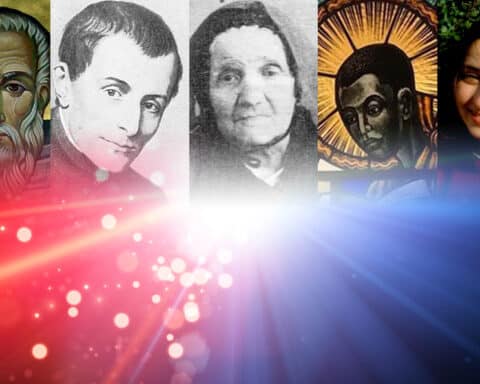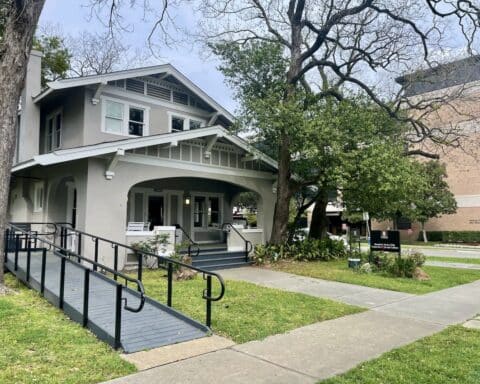It’s easy to wring our hands at the sexual mess out there. Blame it on the worldwide Anglican communion that caved to bless same-sex unions early this year, and the German Catholic bishops who just seconded that emotion. Or our distress at another allegation of clerical abuse cover-up. Offset by our national leaders equating trans rights with routing sexism and racism? Join the club.
What gets lost in our “social” concern is the chaos within — the myriad ways we have been pierced by sexual disintegration. Each of us bears the wound. For persons like me — familiar with same-sex attraction and fragile sobriety from porn use — to those like my wife who still bear the scars of childhood abuse, to any family who wonders how to best love members who now identify on the LGBTQ+ spectrum — we are all sexually broken.
I’ve been married to an amazing woman for the last 42 years. Born and raised in California, we both came from solid families but still got seared by the sexual revolution. My wife, Annette, from San Francisco, witnessed older siblings stressing out the family with sexual promiscuity and “gay” identification. When a random cousin on military leave raped her, Annette defended herself from any notion that sexual love was a gift to be respected and protected.

Meanwhile, I hunkered down with porn amid heightened shame and isolation over same-sex attraction. I leapt the visuals into a thriving “gay” subculture of my Los Angeles beach town. Loving the adventure for a couple years, I came to disdain my incapacity to love anyone for long.
Annette and I met several years after I had left this identification with “gay” everything for a newfound relationship with Jesus. I aspired spiritually to integrate my masculinity; she was cautious, I, uncertain.
Grace prevailed as we kindled faith together and warmed to each other. It helped to surround ourselves with an insightful community of Christians who loved us as we fell in love with each other. We grew in our gift-giving: she deepened in trust and responsiveness, and I sought the help and courage I needed to give her something good to receive. We welcomed mentorship from a married couple who had navigated same-sex attraction well. And we both benefited from a close group of friends who provoked one another to chaste living. We were wounded yet clear: Jesus didn’t shed blood to make us liars!
Our pastors asked us to help others with identified sexual sins and wounds. We proceeded cautiously but with clarity that Jesus was leading us. We started a weekly support group, then another, which we called Living Waters, like the liquid love Jesus promised the Samaritan woman in John 4.
An epiphany of mercy
At this point, Annette had an epiphany of Jesus’ mercy for herself. Still wounded by others’ sexual sin, including her abuse and my residual immaturity, she was inclined to see herself as a little less in need of Divine Mercy than the rest of us. The Holy Spirit challenged her as we led a gathering of deeply disintegrated men and women. Tempted by the pride that she had never succumbed to such debauchery, Jesus whispered: “Are you any less in need of my mercy?” She burst into tears, welcoming prayers from the prodigals.
That’s why we love Divine Mercy. Not content to just talk about it, we need to bathe in it! God’s vision to St. Faustina of the resurrected Jesus releasing blood and water from his wounded heart is more prescient than we can imagine! The Divine Mercy image reveals something of Jesus’ superabundance for Christians divided by sin-sickness. Just to think of Jesus looking at us with such love while inviting us into that cleansing, revitalizing flood is our cure.
“If you don’t believe my words, believe my wounds!” said Jesus to Faustina. We, the sexually wounded, believe. Even the Protestants among us have warmed to the Divine Mercy image; our focus on his invitation to full immersion, over and over, becomes our orientation. Sexual wounds may run deep, the echoes of disorder are louder than we like, but his Divine Mercy releases a pool where we can sink into our source — Christ himself. We abide there, trusting him to secure our original dignity as pretty good gifts to each other.
Sexual wounds may run deep, the echoes of disorder are louder than we like, but his Divine Mercy releases a pool where we can sink into our source — Christ himself.
Pools of Divine Mercy. I would like to think the sin-weary and wounded find that in a Living Waters group. Everyone is welcome, that is, those willing to admit some facet of sexual disintegration. And those willing to go through members of Christ to get there. It makes sense — we were wounded in relationships; our cure comes through learning to trust others. Together, we welcome his river of blood and water into our rivers of life and love. We need it. Our imaginations are cluttered, affections disordered, our longings exaggerated or numb. We need to discover Divine Mercy in the Body of Christ. In our bodies.

Seeking to be united in our sexuality and spirituality, we encounter division. On one hand, we try and love Jesus and his friends with all our hearts. On the other hand, our hearts are wounded by our own compromises or the bad choices of those we love most. Our Catholicism competes with a culture of sexual idolatry; we worship the One alongside many other altars that clamor for our attention.
At the end of the day, you like me wonder: How sound is my sexual gift? Given the pervasive moral haze, how clear and focused are my powers of life and love? If the goal of our sexual humanity is to dignify others, especially the opposite sex, do I? Or do I confuse or diminish her? Will my children inherit the mark of my faithfulness or neglect? Monogamy or veiled adultery?
Most of our sexual sins are obvious and shameful. Enough said. What we may not have considered are the fault-lines that lie underneath our boundary-breaking ways. I submit this not as an excuse but as an invitation of Divine Mercy for you, a wounded man or woman. Now hear me: I am not apt to cry “victim.” Like you, I heed our Mass prayer: “I confess to almighty God and to you, my brothers and sisters, that I have greatly sinned … through my most grievous fault.”
Yet overcoming my fault may well require a shoring up of uneven, eroded, even toxic foundations of our personhood. We consider them before the Lamb slain to take up our infirmities and carry our sorrows (cf. Is 53:4, NIV). That Hebrew word for ‘”infirmity” covers not only our sins but those sins visited on us by others. Our grief becomes good before him as we own that suffering and unite it to him who suffered to heal us. “By his wounds we were healed” (Is 53:5).
Origins of our wounds
Here are a few wounds we invite our fellows to consider and submit to the One who binds up broken hearts. The first is subtle but very real. When we grew up in families where parents tried and often failed to convey respectful, mutually submissive love, we may struggle to agree from our heart that the imago dei — man for woman and woman for man — is a good thing, even a viable thing.
Is our lens through which we view male-female relations distorted? It can help to exchange lies we internalized about men or women for truth — the truth of your capacity to live and love differently and to discern that quality in those you choose to love. We may need to lay down embittered defenses against a parent’s perceived failure here. Jesus helps us. And he will use whole-enough examples of the imago dei in our communities to envision us afresh.
I recall Sue who opted out of opposite-sex relating for a variety of reasons, including her unhappy single mother. Helpful for Sue was a young married couple in church who usually sat in front of her on Sunday, tag-teaming care for their newborn. Sue had not witnessed parents bearing with each other on behalf of a child. Their love introduced her to another way. She witnessed a man contributing to the security of a woman (and child), not destabilizing her.
Is it any wonder that men and women who claim homosexual feelings as adults are up to seven times more likely than their peers to have been sexually violated as children?
It opened her up to realizing something desirable lay beneath her frustrating habit of overly intense same-sex friendships. The truth compelled her to yield to Divine Mercy (and our help); we did our part, but it was her pursuit of realizing the truth within, the witness of Eden in her heart, that no amount of early conditioning could betray.
Something basic lies behind early patterns of addictive (and ultimately frustrating) behaviors. Therapists point out early traumatic events that break trust and incline us toward broken ways of meeting normal needs. Dr. Gerald May writes compellingly about these destabilizing experiences that offset our equilibrium as children. Often unable to understand, let alone to seek help for the disruption at hand, we reach for something that will secure us.

My friend Rob connects early porn use with his father abandoning the family early on while his mom drew closer to her only child in solidarity against the loss at hand. Rob grew up quickly, learned to attune to the needs of his mom, and connected with porn early on as a way of dealing with his own grief and need. Did a broken home cause his habit? Of course not. Did it contribute? For sure.
Helen’s dad was a taskmaster — a strong, formidable guy whom she revered and feared. He challenged her constantly, encouraged her rarely, and set her up for a craving for masculine attention that she received from a young adult male 10 years her senior. She felt shame for how he touched her but habituated easily to his attentiveness. The relationship lasted 3 years until the man moved away. Helen kept silent for 20 years until Living Waters. It was the beginning of sorting out her disdain of herself, of men and of sexuality altogether.
Ken’s Uncle Jim did the same with him: witnessing Ken’s vulnerability, he favored him to take advantage of him sexually whenever they were alone. Jim was his mom’s favorite brother. Ken felt guilt for forbidden acts and sensual pleasure, for betraying his mom, for later same-sex attraction that defied his Christian commitment. He didn’t seek help until he fell sexually with a classmate in seminary. His sin invited a deeper look at the brokenness caused by the most formative sexual relationship of his life — abuse from his uncle.
Is it any wonder that men and women who claim homosexual feelings as adults are up to seven times more likely than their peers to have been sexually violated as children?
| Divine Mercy Sunday |
|---|
|
In 2000, Pope John Paul II established Divine Mercy Sunday as the Second Sunday of Easter. A year later in a homily for Divine Mercy Sunday, the pope said the following: “‘Jesus, I trust in you.’ This prayer, dear to so many of the devout, clearly expresses the attitude with which we too would like to abandon ourselves trustfully in your hands, O Lord, our only Savior. “You are burning with the desire to be loved and those in tune with the sentiments of your heart learn how to build the new civilization of love. A simple act of abandonment is enough to overcome the barriers of darkness and sorrow, of doubt and desperation. The rays of your divine mercy restore hope, in a special way, to those who feel overwhelmed by the burden of sin. “Mary, Mother of Mercy, help us always to have this trust in your Son, our Redeemer. Help us too, St. Faustina, whom we remember today with special affection. Fixing our weak gaze on the divine Savior’s face, we would like to repeat with you: ‘Jesus, I trust in you.’ Now and for ever. Amen.” |
Reclaiming chastity
We need to get real with what lies beneath our sinful symptoms. In a day when we give adults every sexual liberty they choose and leave kids to face the immoral fall out, we must contend for a chastity that considers the potholes of our overexposed early lives. Neglected and unsupervised, forging virtual connections that drive and demonize us, we may well have been subject to disordered adults whose lust descended below ages of consent. And subject to our own disordered disorders. Even if we consented to immoral unions as adults, we were 19 going on 9-years-old emotionally in our moral capacity to dignify the latest squeeze.
In the end, we do well to examine the forces that have persuaded us to confuse normal emotional needs with sexual ones. Many things in our culture and in the gaps in our emotional development contribute to this. Some of us cannot point to specific traumatic events in our early lives. But we can attest to a toxic blend of perceived sexual emptiness, and peer rejection (thus hating ourselves) that contributed to adopting immoral identities and behaviors (with either gender).
We can trust the healing properties of Father, Son and Holy Spirit in this one Church to help us take ground in robust chastity.
For example, I confused “gay” solidarity with forging important and much needed solidarity with other men — a task most boys accomplish in their preteens before crossing over to the brave world of girls.
When I recognized this, I could begin to separate my real needs from lust. I still had to heal — to find the narrow way through the haze of cultural norms with the light of an awakening conscience.
We have the resources. We can trust the healing properties of Father, Son and Holy Spirit in this one Church to help us take ground in robust chastity. Here are some keys to this healing of our sexual brokenness.
Healing our brokenness
First, we can trust the deeper truth at work in our members beset by troubling symptoms. Each of us was made for dignity and to dignify others. No amount of sin and wounds can quell this destiny. More than a problem to be healed, we are a people becoming more of who we truly are. We at Living Waters are just inviting others to align with their truth, what it means to represent him in original dignity.
Second, in accord with a bishop’s and parish priest’s blessing of Church-aligned materials and praxis (Living Waters has both), we can trust well-equipped and ordered lay persons to accompany their fellows to greater wholeness. Members can progress in healing relationships where mercy overtakes shame and blessing of one’s sexual personhood replaces self-doubt and hate. That requires proper boundaries and goals. Within these limits, being-healed-ones can realize how they can be gifts to others in their healing.

Third, we discover connection with others, fully clothed, rather than resorting to childish ways (fantasy, porn use, sexually immoral relationships). We become self-aware and empowered in Jesus; we activate our wills in combating familiar demons. We do this in humility, becoming known as weak people in need of others before falling back into demeaning patterns.
We learn the iconography of others’ humanity. How liberating for people accustomed to lust to begin to see a man or woman of God’s design who mediates grace. We learn to welcome icons that glorify God rather than worship idols.
What started as an effort to curb bad behavior becomes transformation of our very lives.
Fourth, we trust the Holy Spirit to teach us to pray effectively for our fellows. He gives gifts freely to restore his people. These gifts are not the domain of a sacred few but for all who long to build the Body of Christ. Small group leaders model a simple method of listening to each other and to Jesus who really cares about our needs. Each person takes his or her place on the healing team; we begin to see miracles.
Jesus goes back with us to the original injury and shows us his healing love. Over and over, he makes himself known as the One who sustained us at junctures of confusion and distress. We welcome his solidarity in ways that we could not recognize then — this liberates his light of truth in the place of lies, good grief instead of worldly sorrow and despair. We may well need a season of integrating pain related to the real gaps in our lives. The difference? We are not alone! Jesus surrounds us with his friends.
The effect of all this? We come out of sin and self-reliance and into the truth. God made us for real love: to receive it and to offer ourselves in life-giving ways for others’ good. Our sexuality is at the core of that — we always offer ourselves as uniquely male or female, and we are becoming okay with our versions of that!
What started as an effort to curb bad behavior becomes transformation of our very lives. We continue to heal as we make room for every thirsty soul at the pool of Divine Mercy.
Much can be said about the Church inflicting sexual wounds. That may be true. Truer still is her capacity to heal the wounds we brought into the Church. Let us liberate her best for the sexually broken, beginning with our saturation in Divine Mercy.
| Praying the Divine Mercy Chaplet |
|---|
|
Traditionally prayed at 3 p.m. — the hour of mercy, when Christ was crucified and died — on rosary beads, the Divine Mercy Chaplet is a simple way to seek God’s mercy in your own life. It takes about seven minutes to pray the entire chaplet, making it a great devotional to pray in groups, such as families. The main prayers include the following:
For more complete instructions, visit thedivinemercy.org. |
Andrew Comiskey is the founding director of Desert Stream/Living Waters Ministries, which provides help for Christians struggling with sexual and relational problems. Learn more at desertstream.org.






